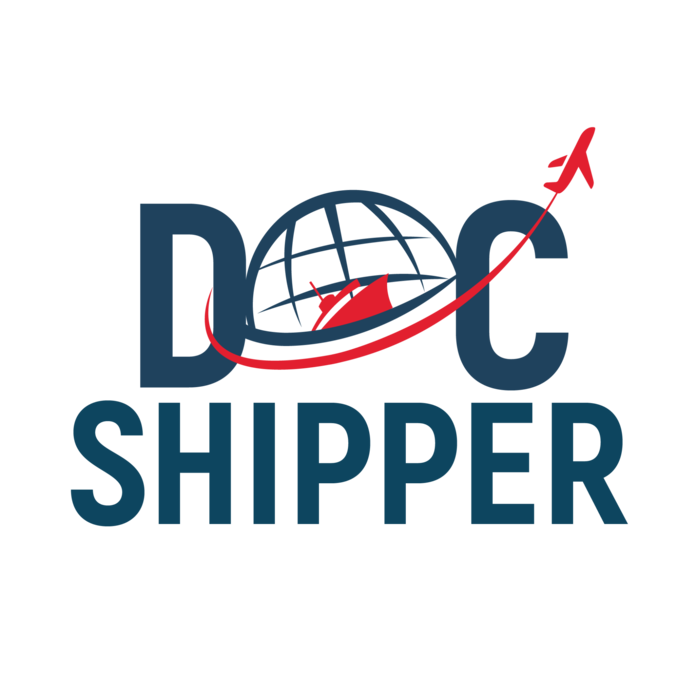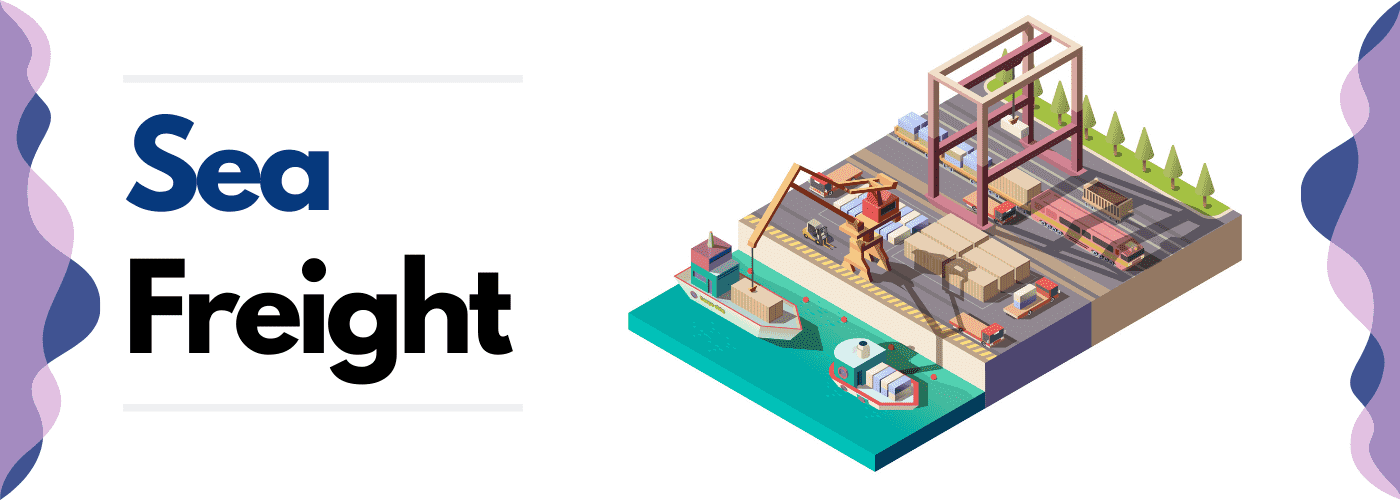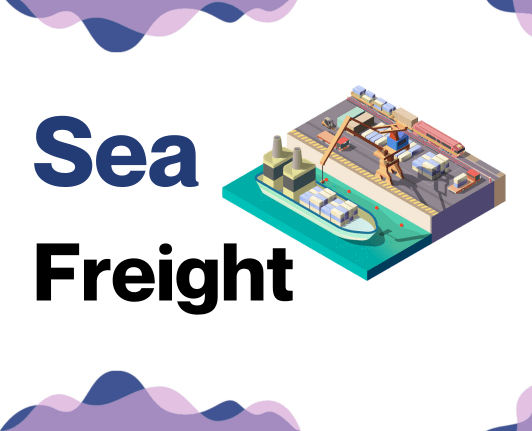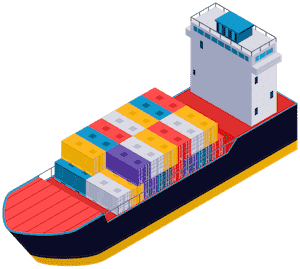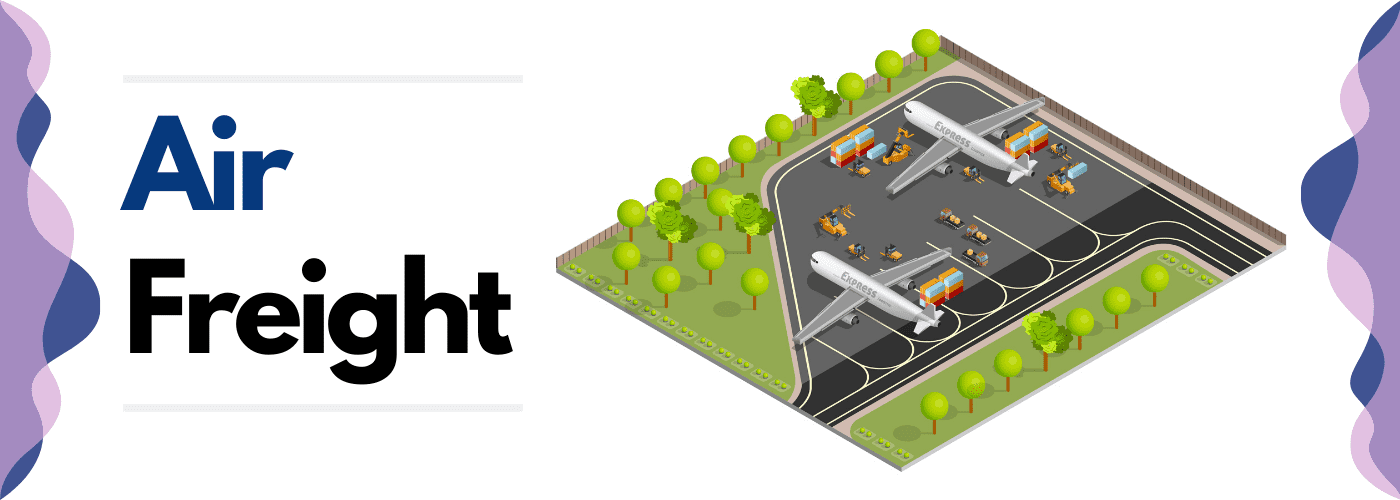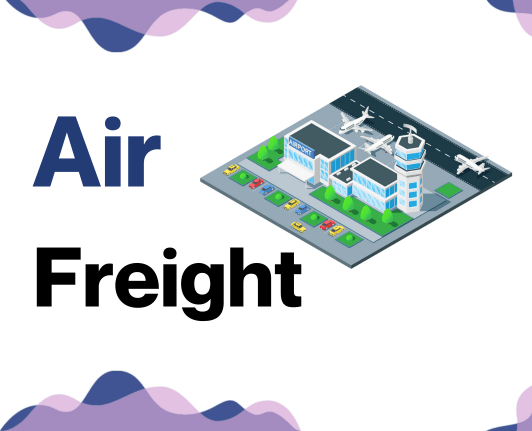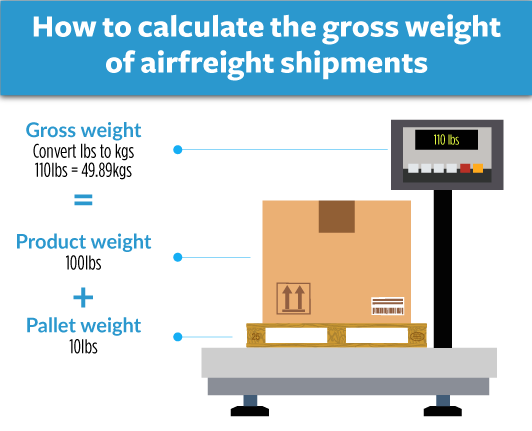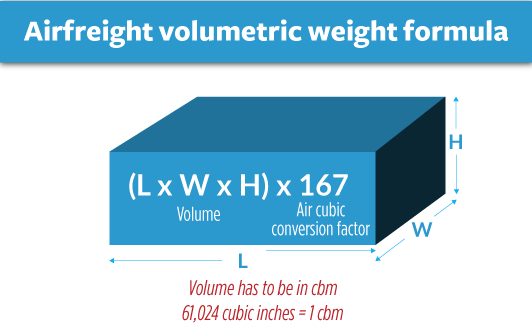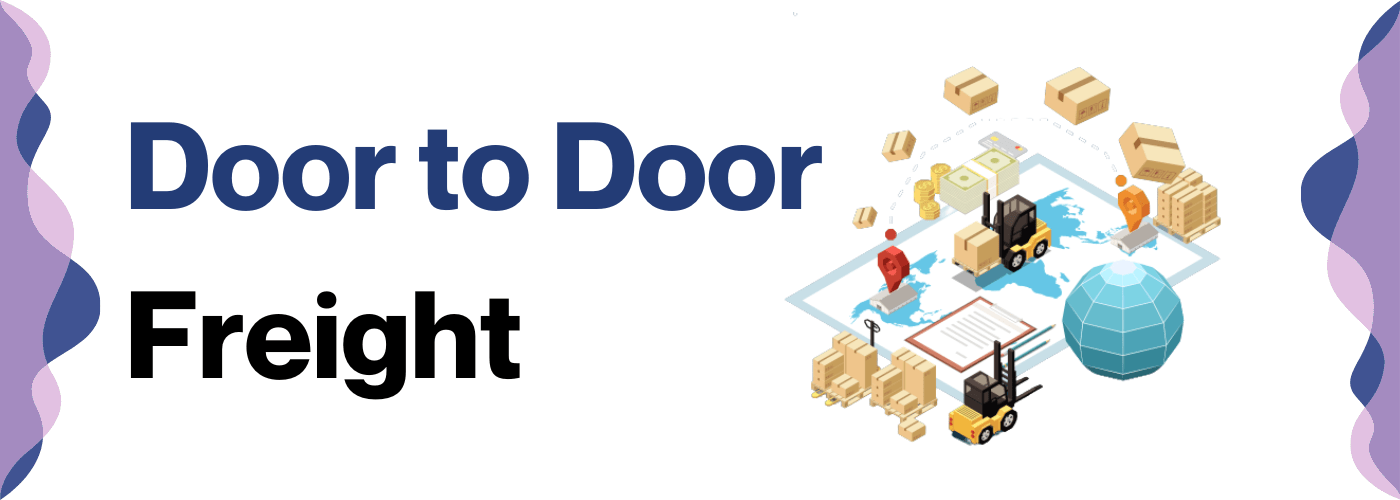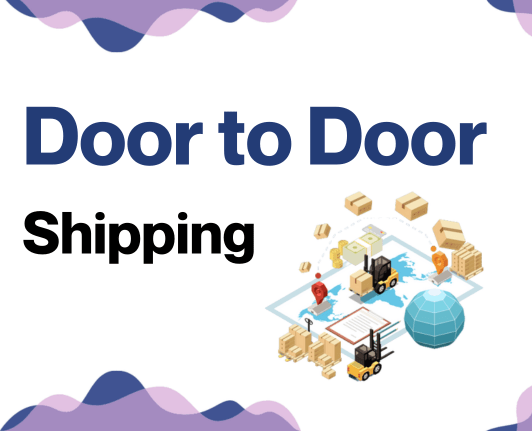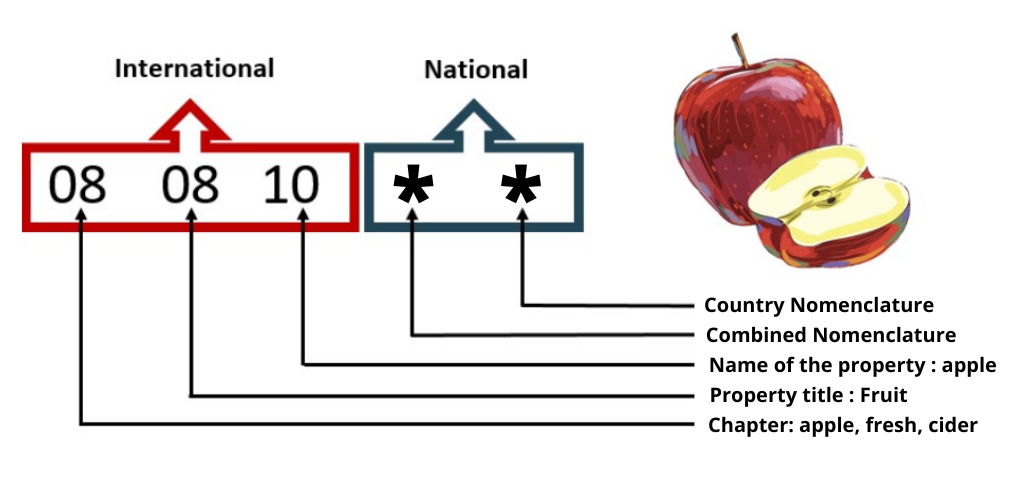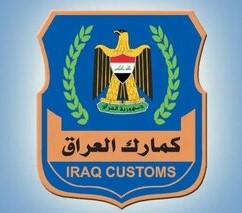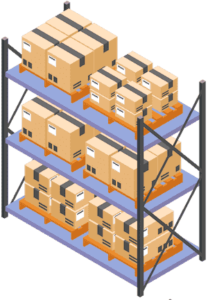Has freight shipping to Iraq from the US turned into your version of a Rubik's cube, only far less colourful and fun? You're not alone. Many businesses find it difficult to grapple with complex freight rates, fluctuating transit times, and intricate customs regulations.
This guide is here to turn those complications into simplicity. We'll dig deep into your freight options, going beyond the surface of air, ocean, rail, and road transport. We'll demystify the often confusing world of customs clearance, break down any duties, and explain taxes in a language you'll understand.
If the process still feels overwhelming, let DocShipper handle it for you! With our services, every step of the shipping journey becomes smoother, converting your challenges into thriving business opportunities.
Table of Contents
ToggleWhich are the different modes of transportation between US and Iraq?
Shipping goods between the US and Iraq involves a game of logistics chess. Picture this: U.S is your queen, Iraq is the king, and the sea is your playing board. Flying goods 'checkmates' with speed but can get pricey.
The road-rail combo delivers a cost-effective solution, but there's a catch – it's a tad slower and lengthy border procedures may put a damper. Sea transport, however, sails in as the hero, optimizing both cost and volume.
Your game plan? Marry the method to your specific needs. After all, shipping mastery is about making the right moves.
How can DocShipper help?
Expedite your US-Iraq shipping with DocShipper's comprehensive solutions! We manage all logistics, from packaging and customs to timely delivery. Unravel the complexities with our experts on call, anytime. Want a free, 24-hour estimate? Need answers? Consult our team for free today!
DocShipper Tip: Sea freight might be the best solution for you if:
- You are shipping large volumes or bulky items, as sea freight offers the most space at a cost-effective rate.
- Your cargo doesn't have an urgent deadline, as sea freight typically has longer transit times compared to air or rail.
- Your shipping routes are between major ports, allowing you to leverage the extensive global network of sea shipping lanes.
Sea freight between US and Iraq
Ocean shipping between the US and Iraq symbolizes a vibrant trade relationship, bridging diverse industrial sectors across the continents. Major cargo ports, such as Baltimore and Los Angeles on the US side and Umm Qasr in Iraq, serve as crucial links in this massive supply chain. Sea freight shines as a cost-effective solution for shipping high-volume goods, its patient pace a fair trade-off for reduced expenses.
However, the complex jigsaw of international shipping often proves troublesome for businesses and shippers. Imagine trying to complete a puzzle in a dimly lit room, that's what it feels like for many when planning sea freight between these nations.
It's easy to fumble, misplace pieces - make costly mistakes. But the room doesn't have to stay dark. Detailed best practices and specific guidelines in this guide serve as a handy flashlight, illuminating the way and easing the strain of this demanding task. Let's dive deeper and turn on the light.
Main shipping ports in US
Port of Los Angeles
Location and Volume: Located in San Pedro Bay, the Port of Los Angeles is the busiest container port in America, handling over 9.2 million TEUs annually.
Key Trading Partners and Strategic Importance: Its strategic importance lies in its accessibility to the trans-Pacific trade routes, with key trading partners including China, Japan, Vietnam, and South Korea.
Context for Businesses: If you're looking to significantly develop your trade links with Asia, the Port of Los Angeles is an essential addition to your logistics chain due to its volume of trade with these countries, and comprehensive rail and highway links for distribution throughout North America.
Port of Long Beach
Location and Volume: Situated in California, the Port of Long Beach ranks second in container volume among U.S. ports. It handled 7.8 million TEUs in 2023.
Key Trading Partners and Strategic Importance: The Port of Long Beach facilitates trade primarily with East Asian countries; its central location on the West Coast enhances its strategic significance.
Context for Businesses: If your business model relies on speed and efficiency, the port's extensive on-dock rail facilities and advanced cargo handling equipment could make it a viable option for your shipping needs.
Port of New York & New Jersey
Location and Volume: Located on the East Coast, the Port of New York and New Jersey is the third largest port in the US, handling over 7 million TEUs, annually.
Key Trading Partners and Strategic Importance: It serves as a critical hub for trade with Europe, Canada, Asia, and the Middle East.
Context for Businesses: Its massive market reach and specialized terminals could make this port an excellent choice if your aim is to develop versatile, wide-ranging shipping strategies.
Port of Savannah
Location and Volume: Located in Georgia, the Port of Savannah is the fourth busiest container port in the U.S., with a volume surpassing 4.9 million TEUs in 2023.
Key Trading Partners and Strategic Importance: The port maintains significant trading relations with China, Germany, and India.
Context for Businesses: If you're seeking to capitalize on a booming consumer market, the Port of Savannah's access to the Southeast and Midwest U.S. makes it ideal for your business.
Port of Houston
Location and Volume: Nestled in Texas, the Port of Houston - the fastest-growing container port in the U.S. - moved roughly 3.8 million TEUs in 2023.
Key Trading Partners and Strategic Importance: The trading partners of the Port of Houston range widely from Mexico, China, to Brazil.
Context for Businesses: The port's robust infrastructure and deepwater access makes it an excellent choice for businesses involved in the energy and petrochemical sectors.
Port of Seattle
Location and Volume: The Port of Seattle, in Washington, handled a shipping volume of about 3.4 million TEUs in 2023.
Key Trading Partners and Strategic Importance: Boasting robust trade ties with countries in Asia like China and Japan, the port plays a key role in trans-Pacific trade.
Context for Businesses: If you are looking to leverage Pacific Northwest's rich consumer markets and expand your Asian connections, the Port of Seattle with its modern facilities, wide-array of services and strategic location, could offer fruitful opportunities.
Main shipping ports in Iraq
Port of Umm Qasr
Location and Volume: Located in Basrah in Southern Iraq, the Port of Umm Qasr is the primary maritime outlet for the country. It accounts for the majority of Iraq's maritime trade, handling a substantial shipping volume annually.
Key Trading Partners and Strategic Importance: The port's key trading partners include Iran, Kuwait, and nations in Southeast Asia with a major portion of its trade constituting oil exports and agricultural imports. Its advantageous position at the mouth of the Gulf mandates its undeniable strategic importance; it is close to key trading routes and offers direct access to the Arabian Gulf.
Context for Businesses: If your business is engaged in the oil, agricultural, or industrial sector or seeks expansion opportunities into these markets, The Port of Umm Qasr could be a prime candidate in your logistics framework. Its connectivity to primary Asian markets and energy hubs provides plentiful opportunities.
Port of Khor al-Zubair
Location and Volume: Nestled in the governorate of Basra, the Port of Khor al-Zubair is a little far from the Basra center. Despite its positioning, it handles a meaningful volume of shipping containers annually, indicating its significance in the commercial landscape.
Key Trading Partners and Strategic Importance: The port primarily services trading partners in the Middle East and Asia, dealing mainly in oil exports and agricultural imports. Its location, adjacent to a free-trade zone, underlines its strategic relevance.
Context for Businesses: Should your business involve aspects of industrial or agri-trade or cater to markets in the Middle East and Asia, the Port of Khor al-Zubair aligns well with your shipping strategies. The surrounding free-trade zone structure can lend advantageous import-export benefits.
Al Maqal Port
Location and Volume: Al Maqal Port is a smaller, riverine port located in the city of Basra. While it does not support an immense volume of shipping in comparison to larger ports, it plays a strategic role in its own right.
Key Trading Partners and Strategic Importance: The port exhibits a more localized trading pattern, engaging in commerce with proximal Middle Eastern nations dominantly.
Context for Businesses: If your business seeks an advantageous spot for small-scale trade across the region, Al Maqal Port may satisfy your logistics layout. Its capabilities are more adept at handling a conservative scale of maritime trade, making it fit for more specific or niche requirements.
Should I choose FCL or LCL when shipping between US and Iraq?
When shipping between the US and Iraq, deciding to use a Full Container Load (FCL) or Less than Container Load (LCL), also known as consolidation, isn't just about stuffing items into a box. It's a strategic call, one that impacts cost, delivery time, and your overall shipping success. This section will delve into the crux of these two main sea freight options, enabling you to understand their differences and make a choice that best suits your particular business needs. It's time to set sail on this voyage of informed decision-making!
LCL: Less than Container Load
Definition: LCL or 'Less than Container Load' refers to a method of shipping where your goods occupy a portion of a container and share it with the cargo of other shippers. It's a cost-efficient solution favored in international logistics.
When to Use: For cargo that doesn't fill up a whole container (approximately less than 13 to 15 CBM), opting for LCL shipment can offer both cost savings and flexibility. It allows businesses to ship goods more frequently and without the pressure of filling an entire container.
Example: Let's assume small US-based toy manufacturer wants to ship a single pallet, about 2 CBM, of toys to a retailer in Iraq. Instead of waiting to have enough goods to fill a container, they can ship the goods whenever they are ready using LCL freight, thus delivering the products faster and maintaining a consistent supply.
Cost Implications: The cost of LCL shipping is typically determined by the volume that the cargo occupies in the container. So, even though the per-unit cost might be higher than full container load (FCL), for small volumes, the overall cost could still be lower. Remember, additional costs such as port handling fees, customs duties, or freight charges will still apply.
FCL: Full Container Load
Definition: FCL, or Full Container Load, refers to exclusive use of a 20'ft or 40'ft container for the shipping of goods, usually by sea. This means only your merchandise fills and seals the container from origin to destination.
When to Use: FCL shipping is a cost-effective and safer choice when the volume of your cargo exceeds 13 to 15 cubic meters (CBM). It's beneficial for high-volume shipments due to economies of scale and also provides enhanced safety, ensuring that the goods remain untouched until unsealed at their destination.
Example: Let's say you're a manufacturer of construction equipment in the US, exporting multiple heavy machines to Iraq. Considering the volume and weight, an FCL container would be ideal. You'll receive an FCL shipping quote and make arrangements for a suitable size of the container, without any shared space.
Cost Implications: While FCL may be slightly more expensive upfront due to the exclusive use of the container, if your cargo is more substantial, it typically results in a lower cost per unit shipped. By filling an entire 20'ft or 40'ft container, the overall shipment cost is distributed across more items, making it cheaper in the long run.
Unlock hassle-free shipping
With DocShipper, shipping cargo between the US and Iraq becomes a breeze. Our ocean freight experts will guide you whether consolidation or a full container is ideal, considering factors like your budget, volume of goods, and shipment urgency. We aim to streamline your logistics, making your cargo journey hassle-free. Ready to simplify your shipping? Contact us now for a free cost estimation.
How long does sea freight take between US and Iraq?
Navigating sea freight between the US and Iraq typically takes an average of 40-45 days, depending on various factors. These factors can include specifics such as the ports being used, the weight of the cargo, and the nature of the goods being shipped. It's always a good idea to reach out to a trusted freight forwarder like DocShipper for a bespoke quote pertaining to your unique shipping needs.
Below is a text-only table showcasing the average transit times in days for sea freight between the major freight ports in both countries:
| Ports of US | Ports of Iraq | Average Transit Time (Days) |
| Port of Los Angeles | Port of Umm Qasr | 73 |
| Port of Houston | Port of Umm Qasr | 54 |
| Port of South Louisiana | Port of Umm Qasr | 61 |
| Port of New York and New Jersey | Port of Umm Qasr | 38 |
*Please note: Iraq has only one main sea port, which is Umm Qasr. Therefore, the average transit times are listed considering only this port.
How much does it cost to ship a container between US and Iraq?
Grasping the cost of shipping a container between the US and Iraq may not be straightforward. Prices can range widely per CBM due to factors such as Point of Loading, Destination Point, carrier choice, nature of goods, and ever-changing ocean freight rates.
We could attempt to fix a sourcing cost, but this could mislead you due to monthly market fluctuations. So here's our promise to you – at every step and for every shipment, our dedicated shipping specialists are committed to working closely with you.
They'll craft a shipping cost structure that best suits your unique needs. Our quotes aren't 'one-size-fits-all' - they're tailored to every specific case. Trust us to deliver accurate, competitive, and transparent rates.
Special transportation services
Out of Gauge (OOG) Container
Definition: An OOG container is a transport option designed to accommodate out of gauge cargo that exceeds standard container dimensions.
Suitable for: This type of shipping is ideal for over-sized cargo that cannot fit into standard sized containers.
Examples: Large machinery, industrial equipment, and large pieces of art or monuments.
Why it might be the best choice for you: If your cargo is too large for standard options, choosing an OOG container ensures safe transport of even the most unusually sized goods.
Break Bulk
Definition: Break bulk involves shipping cargo piece by piece, typically loaded onto pallets or into crates.
Suitable for: This method is most fitting for businesses shipping large quantities of goods that can easily be separated into smaller packages.
Examples: Furniture, paper products, metal parts, and raw materials.
Why it might be the best choice for you: If your cargo can't be containerized due to size, shape, or quantity, then break bulk could be a practical solution.
Dry Bulk
Definition: Dry bulk shipping involves the transportation of commodities in large quantities, stored without packaging in the cargo holds of a ship.
Suitable for: Ideal for commodities that can be poured, such as grain, coal, cement or other similar materials.
Examples: Farm produce, minerals, construction materials.
Why it might be the best choice for you: If your business deals with loose cargo load that's granular and manageable sans packaging, the dry bulk method is a cost-effective choice.
Roll-on/Roll-off (Ro-Ro)
Definition: A ro-ro vessel allows cargo to be rolled on and off the ship, typically using a ramp.
Suitable for: Best suited for wheeled cargo like cars, trucks, semi-trailers, trailers, and railroad cars.
Examples: Automobiles, tractors, bus fleets, and rail wagons.
Why it might be the best choice for you: If your business involves vehicles or other self-propelled, towable machinery, Ro-Ro is the quickest and most convenient method to choose.
Reefer Containers
Definition: Reefer containers are refrigerated containers that control the temperature inside, allowing perishables to be shipped over long distances.
Suitable for: Businesses shipping perishable goods or temperature-sensitive cargo.
Examples: Pharmaceuticals, fruits, vegetables, meat, and dairy products.
Why it might be the best choice for you: For those who operate in sectors where product freshness is critical, these temperature-controlled containers are an essential logistics investment.
At DocShipper, we understand the intricacies associated with the myriad of freight shipping options. We invite you to tap into our expertise. Contact us for a free shipping quote in less than 24 hours. Your cargo, our priority.
DocShipper Tip: Air freight might be the best solution for you if:
- You are in a hurry or have a strict deadline requirement, as air freight offers the fastest transit times.
- Your cargo is less than 2 CBM (Cubic Meter), making it more suitable for smaller shipments.
- Your shipment needs to reach a destination that is not easily accessible by sea or rail, allowing you to tap into the extensive network of global airports.
Air freight between US and Iraq
Quick and dependable, air freight serves as a crucial link between the US and Iraq. It shines for compact, high-value shipments – think crucial medical equipment or tech components.
While sea or ground transport may be cheaper for bulky cargoes, air freight offers unbeatable speed and reliability. But beware – without due diligence, costs can pile up. Missteps like underestimating your shipment's weight can lead to unpleasant surprises in costs. Not being in the loop of best practices might hit your wallet hard.
We'll unravel common mistakes, helping you steer clear of excessive expenses in the air freight world. By understanding all the factors involved, you’ll be able to squeeze every ounce of value out of your air freight endeavors.
Air Cargo vs Express Air Freight: How should I ship?
Struggling to choose between Air Cargo and Express Air Freight for your US-Iraq shipments? In simple terms, Air cargo tucks your goods into a shared airline, while Express sends them off on a dedicated plane -akin to opting for public transport versus a private cab in the skies.
This guide section dives deep into both, helping you align your shipping strategy with your business requirements. Let's find an effective, efficient transport solution tailored specifically for your trade.
Should I choose Air Cargo between US and Iraq?
Opting for air cargo between the US and Iraq could be a valuable decision for your business, especially if you have over 100/150 kg (220/330 lbs) of cargo. Known for cost-effectiveness and reliability, airlines like Delta Airlines and Iraqi Airways are key players in this sector.
While beneficial, do remember schedules are inflexible, which may result in longer transit times. Ultimately, this method could align with your budgetary needs whilst ensuring effective transportation.
Should I choose Express Air Freight between US and Iraq?
Express air freight, a service by dedicated cargo planes sans passengers, is a quick, hassle-free shipping method ideally suited if your cargo is under 1 CBM or weighs between 100/150 kg (220/330 lbs). It's speed and reliability make it an excellent choice for time-critical goods.
World-renowned courier firms like FedEx, UPS, or DHL lead in providing these services, ensuring your cargo's timely arrival. If your shipment fits these parameters, this option could be a real game-changer and improve your supply chain efficiency.
Main international airports in US
Los Angeles International Airport (LAX)
Cargo Volume: Los Angeles International Airport processes over 2 million metric tons of cargo annually.
Key Trading Partners: China, Japan, and Australia are key trading partners.
Strategic Importance: LAX is strategically located as a gateway to the Asia-Pacific region, ensuring fast and efficient transport of goods.
Notable Features: It hosts a fast-track customs facility for expedited cargo clearance and boasts a modern, high-capacity cargo terminal.
For Your Business: LAX provides timely, efficient access to key international markets, ideal for businesses requiring quick transit times.
Miami International Airport (MIA)
Cargo Volume: With an annual cargo volume of over 2.3 million metric tons, MIA ranks first in the US for international freight.
Key Trading Partners: Among its main trading partners are Latin American and Caribbean countries.
Strategic Importance: MIA offers the business advantage of being the closest US airport to Latin America, a major global economic powerhouse.
Notable Features: MIA features an extensive perishable cargo facility, a key factor for businesses dealing with temperature-sensitive goods.
For Your Business: This airport is ideal if your business focuses on trade with Latin America, or deals with perishable goods.
John F. Kennedy International Airport (JFK)
Cargo Volume: JFK handles about 1.5 million metric tons of cargo annually.
Key Trading Partners: Main trading partners include the European Union, Canada, and China.
Strategic Importance: JFK's location on the East Coast gives it strategic importance for transatlantic trade.
Notable Features: Features include specialist facilities for valuable freight like textiles, pharmaceuticals, and electronics.
For Your Business: Its strong connections with Europe make JFK a smart choice for businesses with strong trading ties to this region.
Chicago O’Hare International Airport (ORD)
Cargo Volume: ORD processes more than 1.8 million metric tons of cargo annually.
Key Trading Partners: ORD connects with major markets in Europe, Asia, and South America.
Strategic Importance: Its central location makes it a hub for both domestic and international shipments.
Notable Features: ORD has a special freight handling facility for oversized cargo, along with a world-class infrastructure for efficient loading and offloading.
For Your Business: If you're dealing with oversized cargo or prefer a well-connected central hub, ORD serves as an excellent choice.
Hartsfield–Jackson Atlanta International Airport (ATL)
Cargo Volume: ATL handles over 2.7 million metric tons of cargo per year.
Key Trading Partners: This airport serves key markets around the globe including Europe, Asia, and Africa.
Strategic Importance: Known as the world's busiest airport by passenger traffic, it also serves as a key hub for domestic and international cargo shipments.
Notable Features: ATL features a state-of-the-art perishable cargo complex and advanced animal handling facilities.
For Your Business: ATL's extensive connectivity and specialized facilities make it a versatile choice for various business shipping demands.
Main international airports in Iraq
Basra International Airport
Cargo Volume: Basra International Airport handles a moderate volume of cargo, playing a significant role in Iraq's air freight industry.
Key Trading Partners: The airport has multiple trading partners, including countries in the Middle East, Europe, and Asia.
Strategic Importance: Situated in the south of Iraq near major industrial and oil production facilities, it serves as a critical portal for equipment and supplies.
Notable Features: It has a dedicated cargo terminal equipped with modern facilities to support a wide range of freight types, including perishable and hazardous.
For Your Business: If your company exports to the southern Iraq region, Basra Airport offers reliable and efficient cargo handling services along with clear routes to key markets.
Erbil International Airport
Cargo Volume: Erbil International Airport is one of the busiest cargo airports in Iraq, managing substantial freight traffic annually.
Key Trading Partners: Its major trading partners are Middle Eastern, North American, and European countries.
Strategic Importance: Its proximity to the autonomous Kurdistan region gives it strategic importance.
Notable Features: The airport has robust cargo handling amenities, including facilities for temperature-sensitive goods such as pharmaceuticals.
For Your Business: If you are thinking of doing business in the autonomous Kurdistan region, this airport offers a secure and efficient shipping route to reach this growing market.
Baghdad International Airport
Cargo Volume: As the largest airport in Iraq, it manages a high volume of cargo traffic.
Key Trading Partners: The airport's key trading partners consist of countries across the Middle East, Europe, and Asia.
Strategic Importance: Being the capital's airport, it is a significant transportation hub for businesses with trade operations in central Iraq.
Notable Features: The airport houses a specialized cargo village specially designed for speedy and effective cargo handling.
For Your Business: Its centralized location and high cargo-capacity make it an optimal choice if your supply chain involves regular freight transportation to and from Iraq's central region.
Sulaymaniyah International Airport
Cargo Volume: The airport manages a modest cargo volume, but plays a crucial role in connecting the region to key trade partners.
Key Trading Partners: Primarily, these include Middle Eastern countries along with Europe and Asia.
Strategic Importance: Located in Iraq's Kurdistan region, it plays a crucial role in supporting business in the area.
Notable Features: The airport boasts cutting-edge cargo handling facilities, and specializes in both general and temperature-controlled goods.
For Your Business: If your business focuses on the Kurdistan region, leveraging Sulaymaniyah Airport's facilities could streamline your logistics and reach within this area.
Najaf International Airport
Cargo Volume: Although smaller than the others, the airport still handles a notable amount of cargo.
Key Trading Partners: Major trading partners include Middle Eastern countries, along with Europe and select countries in Asia.
Strategic Importance: Given its location in the south of Iraq, it plays an important role in catering to businesses operating in the region.
Notable Features: Offers efficient freight operations, handling a variety of cargo services including general and temperature sensitive goods.
For Your Business: If your business targets markets in southern Iraq, Najaf Airport's efficient cargo handling and connectivity could enhance your supply chain operations in the region.
How long does air freight take between US and Iraq?
Shipping by air freight from the US to Iraq typically takes between 1 to 3 days. However, this transit time can vary depending on several factors. The specific airports of origin and destination, the weight of your shipment, and the nature of the goods you're shipping all play a role in determining the actual shipping time. For the most accurate timelines, it's best to consult with a freight forwarder like DocShipper.
How much does it cost to ship a parcel between US and Iraq with air freight?
Shipping rates per kg for air freight parcels from the U.S. to Iraq broadly average between $5-$10. Accurate costs, however, depend on variables such as pickup and delivery points, dimensions, weight, and nature of the goods — making pre-set pricing unfeasible.
Rest assured, our team dedicates its expertise to negotiate your best rates, providing personalized quotes case-by-case. With us, you're not navigating the complex world of air cargo alone. Keen on making this journey with us? Reach out for a free quote, guaranteed in less than 24 hours.
What is the difference between volumetric and gross weight?
Gross weight is the total weight of your goods, including packaging, pallets, and any other materials included in the shipment. On the other hand, volumetric weight, sometimes called dimensional weight, estimates the weight of the shipment based on the space it takes up within the cargo bay.
In Air cargo, volumetric weight is typically calculated using the formula: Length x Width x Height (in cm) / 6000. Suppose you're shipping a pallet of goods from US to Iraq that is 120cm long, 80cm wide and 100 cm high. You'd calculate dimensional weight as follows: 120 x 80 x 100 / 6000 = 160 kgs (approximately 353 lbs).
Gross weight is simpler - it's just the weight of the goods on the scale, packaging included. Let's say your same pallet weighs 200 kgs on the scale, that’s about 441 lbs.
Express Air Freight usually operates with a slightly different formula for volumetric weight: Length x Width x Height (in cm) / 5000. For the same pallet dimensions, the volumetric weight would be: 120 x 80 x 100 / 5000 = 192 kgs (423 lbs).
Now, for pricing. Freight charges are generally based on either the gross weapon or the volumetric weight - whichever is higher. This is because space on an aircraft is just as valuable as the weight it can carry.
For our hypothetical shipment, in both air cargo and express freight scenarios, the gross weight of 200 kgs (441 lbs) would be used to calculate freight charges. Remember, it's important to consider these factors when estimating freight cost to control your shipping expenses.
DocShipper tip: Door to Door might be the best solution for you if:
- You value convenience and want a seamless shipping process, as door-to-door takes care of every step from pickup to delivery.
- You prefer a single point of contact, as door-to-door services typically provide a dedicated agent to handle all aspects of the shipment.
- You want to minimize the handling of your goods, reducing the risk of damage or loss, as door-to-door minimizes transitions between different modes of transport.
Door to door between US and Iraq
Making international business a breeze, door-to-door shipping is a full-service delivery from pick-up in the U.S. to drop-off in Iraq. It takes the headache out of logistics, offering efficiency, ease, and end-to-end control. With tracking every step of the way, it's stress-free shipping that lets you focus on your business. So, without further ado, let's dive in!
Overview – Door to Door
Take the guesswork out of shipping goods between the US and Iraq with our door-to-door service, a one-stop solution making logistics effortless. Though shipping processes often mean negotiating complex customs and regulations, DocShipper’s door-to-door service mitigates these difficulties, managing all stages for you.
A few hitches, like possible delays, exist - but the convenience overwhelmingly makes this our clients' most preferred service. This seamless service keeps you stress-free by handling intricate steps, letting you focus on your business growth. It’s high time to lift your logistics burden and rely on the trusted care of DocShipper’s door-to-door solution.
Why should I use a Door to Door service between US and Iraq?
Who doesn't love a good hassle-free experience, especially when it comes to intricate logistics? We know all too well that coordinating shipments can be a puzzle, and fitting pieces from the U.S to Iraq isn't a walk in the park. But there's good news - Door to Door service caters to exactly these complications. Here's why this could be your perfect shipping partner:
1. Stress Buster: Instead of juggling multiple responsibilities, D2D services charge themselves with picking up your goods and ensuring they reach their final destination in Iraq. You can sit back, sip some coffee and watch your shipment fly (or sail).
2. Prompt Delivery: Can't afford delays? This is the express lane for your shipment. With everything pre-planned, D2D guarantees a smooth and timely journey for your goods.
3. Special Care for Special Cargo: Got complex or fragile cargo? D2D provides that extra care and attention, ensuring safe delivery. It's like sending your beloved pet on a VIP journey!
4. Trucking and More: D2D doesn’t stop at the port; it ensures that the goods are trucked all the way to the final destination. Less running around for you, more efficiency for your business.
5. Unparalleled Convenience: Think of D2D as your single window for dealing with a multitude of processes. With this service, the often overwhelming world of logistics is simplified greatly for your convenience. Shipping made easy? Absolutely!
So, does Door to Door service sound like the Genie who'll grant all your logistical wishes? We say it's worth a shot!
DocShipper – Door to Door specialist between US and Iraq
Experience seamless door-to-door shipping from the US to Iraq with DocShipper! Specializing in comprehensive logistics, we take care of all your freight needs, starting from packing to transport, and even customs-clearing aspects across air, sea, road, and rail.
No need to worry about any steps, we have them covered. With a dedicated Account Executive at your service, say goodbye to logistical worries. Reach out to us and you'll receive a free, no-obligation estimate within 24 hours or instantly connect with our expert consultants for free advice. Your efficient freight journey starts here!
Customs clearance in Iraq for goods imported from US
Grasping the intricacies of customs clearance - the act of getting your goods officially approved to enter a country - is crucial. When importing goods into Iraq from the US, this process can be intricate, sometimes ensnared with hidden costs and unexpected fees.
Knowledge of duties, taxes, quotas, and import licenses is key to avoid pitfalls like hold-ups in customs. DocShipper can help navigate through these complexities, ensuring smooth operations for all your global logistics needs.
If you need an estimate for your project, our team is just a call away. Simply provide the origin of your shipment, the value, and the HS Code. Stay tuned for our in-depth exploration of these topics in the upcoming sections.
How to calculate duties & taxes when importing from US to Iraq?
Estimating customs duties and taxes when importing from the US to Iraq demands a keen understanding of several key factors. These include the country of manufacture or production, the Harmonized System (HS) Code, the customs value of the goods, and the tariff rate applicable in Iraq, along with any other additional taxes or fees.
In essence, the crux of estimating duties and taxes begins with pinpointing the country where your goods have been manufactured or produced. This is an integral step because duties and taxes are primarily determined by the product's origin.
Whether your goods are made in one facility or several locations in the US will impact the total cost of importing them into Iraq. As each country has its trade agreements and regulations, the country of origin can hugely influence the amount of payable duty.
Step 1 - Identify the Country of Origin
Firstly, identifying your product's Country of Origin is non-negotiable. It dictates trade relations and agreements between your export country, the U.S., and your import destination, Iraq. It determines if your goods benefit from lower or zero tariffs. Second, it outlines the rules of origin.
These govern how your products are classified and can influence the import rules in Iraq. Third, understanding the Country of Origin aids you in complying with import restrictions. For example, Iraq has specific restrictions on certain American goods.
Moving on, this step is crucial in calculating customs duties. Specific countries have preferential rates, and determining your product's origin provides an accurate estimate. Lastly, it helps to avoid customs complications. Providing transparent and correct information not only speeds up the process but also minimizes the risk of delays.
Iraq has a general trade agreement with the U.S. offering reduced customs tariffs for specific goods. Know your products and check the applicable trade agreements to maximize savings. Be wary though, as import regulations could change and restrictions vary based on the product. Always double-check the updated rules in Iraq for a smooth sail. Your international freight forwarder can be a great ally here, providing guidance and ensuring compliance.
Step 2 - Find the HS Code of your product
The Harmonized System (HS) Code is a standardized numerical method of classifying traded products. It is used by customs authorities around the world to identify products accurately and swiftly when they're being shipped internationally, thus simplifying the clearance process. This code is key to determining how much duty you will pay on your goods.
Often, the simplest way to find an HS code is to ask your supplier. They're usually familiar with the products they're exporting, and aware of the corresponding HS codes and related regulations.
If you can't get this information from your supplier, don't worry. We'll guide you through an easy step-by-step process to find it yourself.
First, head to the Harmonized Tariff Schedule available online.
Next, type the name of the product in the website's search bar.
Following these two steps will provide a list of potential HS codes.
Finally, you'll need to check the Heading/Subheading column and locate the HS code specific to your product.
Please note, the accuracy of the HS Code is of utmost importance. A code that's incorrect or imprecise can lead to issues during the clearance process, causing delays and potentially resulting in fines.
Here's an infographic showing you how to read an HS code.
Step 3 - Calculate the Customs Value
Understanding the customs value is crucial to calculate your import taxes and duties when shipping goods from the US to Iraq. It might sound similar, but the customs value is distinct from your product's total value. Instead, it's based on the CIF value - meaning it combines the Cost of your goods, Insurance fees, and Freight charges.
So, if your goods costs $10,000, freight charges are $1,500, and insurance amounts to $200, your CIF, hence customs value, is $11,700. Remember, this calculation can significantly affect your customs obligations, so keep a keen eye on every cost detail to avoid any unpleasant surprises. By doing this, you’ll be keeping your business operations smooth and flexible around customs protocols in Iraq.
Step 4 - Figure out the applicable Import Tariff
An import tariff, in simple terms, is a tax imposed by a government on goods imported from another country. The type of Tariff commonly used in Iraq is the Harmonized System (HS) which assigns codes to goods to impose tariffs on imports from nations such as the US.
If you're shipping, for example, computer monitors from the USA to Iraq, you'll need its HS code, which is 852852. To find the tariff applied to this particular product:
1. Refer to the Iraq Customs Authority or the World Trade Organization's (WTO) database for the specified HS code.
2. Look up the corresponding tariff for the HS code 852852.
Let's say the tariff rate for computer monitors is approximately 5%. To calculate the duties, you'd also need the Cost, Insurance, and Freight (CIF) value of your shipment. If the CIF value is, let's say, $10,000, your import duties would be 5% of $10,000, which is $500.
Navigating tariffs can be complex, but doing so correctly can mean substantial savings in the long run.
Step 5 - Consider other Import Duties and Taxes
When shipping goods from the US to Iraq, instead of solely focusing on the standard tariff rate, be aware that other import duties and taxes might come into play relative to the country of origin and the product's nature.
Let's decipher these with some instances (note these are just examples and the actual rates might differ). Excise duty can be levied on certain products like tobacco, an example rate being 10% of the product value. Anti-dumping taxes are another import cost and apply when a product is sold substantially below its usual value - imagine a $200 product sold for $50. VAT is crucial. In Iraq, a standard rate is 20% of the customs value.
But how do you calculate this? Here's a formula: Customs Value x VAT rate. If your shipment is worth $5,000, then the VAT would be: $5,000 x 20% = $1,000.
Remember, understanding these potential charges helps you avoid unexpected costs and ensures a smooth shipping process. Always consider consulting with a customs expert or freight forwarder for comprehensive guidance on your specific situation.
Step 6 - Calculate the Customs Duties
Knowing how to calculate customs duties is essential when importing goods from the US to Iraq. The formula is straightforward: Customs Value x Customs Duty Rate = Customs Duty. Now, VAT and anti-dumping taxes may also apply. Do note that Iraq's standard VAT rate is 15%.
Let's walk through three examples.
- Say your goods' customs value is $1,000 with a duty rate of 5%. You only have to calculate the customs duty: 1000 x 5/100 = $50. Total charges: $50.
- For the second scenario, let's add in VAT. With a customs value of $1,000, a duty rate of 5%, and a VAT rate of 15%, first calculate the customs duty (as above, $50). Now add VAT: (1000+50) x 15/100 = $157.50. Total charges: $207.50.
- For our final case, include anti-dumping taxes and Excise Duty. With the customs value of $1,000, a duty rate of 5%, VAT of 15%, an anti-dumping tax of 10%, and an Excise Duty of 20%, do these steps in order: customs duty is $50, VAT is $157.50 (calculated on $1,050), anti-dumping duty is $100, and Excise Duty is (1000+50+157.50+100)x20/100 = $261.5. Total charges: $519.
Remember, DocShipper can handle all these calculations and customs clearance for you worldwide, ensuring you never overpay. Don't hesitate to reach out for your free quote that'll be ready in under 24 hours!
Does DocShipper charge customs fees?
DocShipper, serving as a customs broker in both the US and Iraq, handles customs clearance but won't bill you for any government-imposed customs duties or taxes.
These are directly paid to the government. Instead, we charge a fee for our clearance services. It's essential to distinguish between these costs to avoid confusion.
We lay everything bare, providing you with official customs documents as proof you're only paying government-imposed charges. Imagine it like this: while eating at a restaurant, you pay the food costs (customs duties) to the owners and a tip (clearance fees) to the servers who handle your order!
Contact Details for Customs Authorities
US Customs
Official name: United States Customs and Border Protection.
Official website: https://www.cbp.gov/
Iraq Customs
Official name: General Commission of Customs of Iraq
Official website: https://www.customs.mof.gov.iq/index.php/en
Required documents for customs clearance
Untangling the web of paperwork expected for effective customs clearance can be daunting. But worry not, we're here to simplify it. Get ready as we delve deep into defining crucial documents such as the Bill of Lading, Packing List, Certificate of Origin, and Documents of Conformity. Understanding these could be your key to smooth, hassle-free shipping!
Bill of Lading
If you're shipping goods between the US and Iraq, the Bill of Lading (B/L) becomes your best friend. Think of it as a transfer deed - indicating the change of ownership from the shipper (maybe you) to consignee.
Whether it's a Chicago-based machinery part on its route to Baghdad or an Oakland-found olive oil heading to Erbil, the B/L holds your shipment's details, ensuring smoother release at Iraqi customs. Switch to an electronic, or telex, B/L to save time and to simplify corrections. Moving stuff through the air? The Airway Bill (AWB) takes the place of the B/L, adding speed to safety.
However, remember, like a passkey, you'll need the original B/L or an AWB for swift customs clearance at Iraq's ports. Be keen on this to avoid demurrage charges - after all, time is money!
Packing List
No matter if it's via sea or air, when you're shipping goods from the US to Iraq, you can't underestimate the importance of the Packing List. Picture this: you're a tech gadget supplier, and your cargo consists of hundreds of devices, each with its net weight and serial number.
Your Packing List serves as a precise inventory of your shipment, detailing each item, its count, and overall weight. Your Iraqi buyers, not to mention customs officials, rely on this document for verification.
Consequently, your attention to accuracy when preparing the Packing List isn't just tedious bureaucracy. It's about ensuring a smooth handover of goods and avoiding confusion or delays at Iraq's customs points of entry.
Remember, clarity and accuracy can mean the difference between a seamless transaction and a logistical nightmare. So make sure your Packing List is spot-on every time.
Commercial Invoice
Crafting a Commercial Invoice for your US-Iraq shipment can indeed feel like a hurdle, but it's a vital document for smooth customs clearance. It must include precise details like complete address of the seller and buyer, a detailed description of the goods, quantity, total value, and terms of delivery.
Misalignment between this and other documents can derail your shipping timeline. Avoid hiccups by checking all details for accuracy, particularly the Harmonized System (HS) codes.
For instance, if you're shipping craftsman tools, double-check the HS code (820600) on your invoice. Tidy paperwork can help speed up your goods' journey from a Dallas warehouse to a store shelf in Baghdad!
Certificate of Origin
Navigating customs clearance from the US to Iraq? A Certificate of Origin is an essential paper trail that can't be overlooked. This document acts as proof of where your goods are manufactured.
For instance, if your cargo is clothing manufactured in Texas, your Certificate of Origin needs to reflect this. Why is it so important? Because it can unlock preferential duty rates, cutting down your shipping costs significantly.
Making the extra effort to specify the country of manufacture on this certificate can make a world of difference, especially for businesses where every dollar counts. So, double-check this document before you send your shipment.
A detailed Certificate of Origin saves you potential headaches at Iraq customs and keeps your bottom line in the green. Your cargo's journey from the US to Iraq just got a lot smoother.
Get Started with DocShipper
Navigating customs between the US and Iraq can be complex and time-consuming. Eliminate the guesswork with DocShipper's comprehensive customs clearance services. Our experts handle every step, ensuring a streamlined process for your shipments. Make the smart move: Simplify your logistics. Request a free quote now and get your custom solution within 24 hours!
Prohibited and Restricted items when importing into Iraq
Shipping goods to Iraq? Beware of potential pitfalls! A major hiccup can occur if your freight includes items banned or limited by Iraqi customs. This guide simplifies the complex, helping you avoid unexpected troubles. Stay compliant and protect your shipment's journey.
Restricted Products
- Telecommunication Equipment: You need to apply for a special permission from the Ministry of Communications to import telecommunication devices into Iraq.
- Nuclear Materials: For nuclear-related items, you have to acquire a license from the Iraq Nuclear Regulation Authority.
- Cultural Artefacts: If you're dealing with historical artefacts or pieces of art, ensure getting a permit from the Ministry of Culture.
- Weapons and Ammunition: A special permit is required from the Ministry of Interior for importing arms and ammunition into Iraq.
- Medications and Pharmaceutical Products: You have to obtain a licensing from the Ministry of Health for ship any medication or other pharmaceutical goods into Iraq.
- Livestock and Agricultural Products: To ship livestock or specific agricultural products, you'll need a permit issued by the Ministry of Agriculture.
- Endangered Plants and Animals: For any product associated with endangered species, you are required to apply for a permit from Iraq's Environment Protection Authority.
- Hazardous Chemicals: Items deemed potentially hazardous require a license from the Ministry of Science and Technology.
- Alcohol and Tobacco Products: These require special licensing from the General Tax Authority.
Prohibited products
- Alcoholic beverages and products
- Non-Islamic religious materials
- Pork and pork-based products
- Narcotics and drugs (except for permitted medicines with prescription)
- Pornographic materials
- Politically sensitive materials
- Counterfeit money and goods
- Weapons and ammunition
- Explosives and fireworks
- Radioactive materials
- Poisonous or hazardous materials
- Ivory products
- Live animals without permits
- Endangered species and products derived from them, under the Convention on International Trade in Endangered Species (CITES)
- Certain agricultural products, due to quarantine regulations
- Certain plants, seeds, and soils due to ecological regulations.
Are there any trade agreements between US and Iraq
Currently, there's no Free Trade Agreement (FTA) or Economic Partnership Agreement (EPA) in place between the US and Iraq. While this might mean no preferential duties for your shipments, ongoing efforts through the US-Iraq Business Dialog may open potential opportunities.
Developments like the Basra-Haditha railway project could also enhance transit options in the future. Keep an eye on these discussions as they might impact your freight costs and logistics planning.
US - Iraq trade and economic relationship
The US-Iraq economic bond, dating back to Iraq's reconstruction post-2003, has fostered critical partnerships in various sectors. Historically, the oil & gas sector has been the mainstay, with Iraq being America's sixth-largest source of imports and the US being Iraq's largest investor. Agricultural goods, specifically wheat, rank next. Beyond that, bilateral investments and trade have covered infrastructure, healthcare, and education.
As per U.S. Census Bureau, 2022 saw an $11.197 billion trade volume between the two countries. However, the exciting story is Iraq's recent drive to diversify, opening new arenas for US businesses. Muted but growing interest in renewable energy and technology hint at potential future market space, vividly illustrating the evolving dynamics of this partnership.
Your Next Step with DocShipper
Tired of handling complex customs laws between the US and Iraq? Want shipping to be more effortless? Let the DocShipper experts take over. We simplify logistics and save you precious time and resources. If smooth, hassle-free shipping is what you desire, make the smart choice. Contact us today and open the door to seamless global trade.
Additional logistics services
Beyond shipping and customs, DocShipper simplifies your supply chain operations with our comprehensive logistics services tailor-made for your business needs. We're here to support every step of your journey!
Warehousing and storage
Finding the right warehousing service in Iraq can be tricky, especially when your goods need specific conditions like temperature control. Reliable storage is key to safeguard your products and ensure seamless delivery. If you want to take the stress out of the equation, consider exploring our warehousing services which cater to all your specific needs. For more details, check out our dedicated page on Warehousing.
Packaging and repackaging
When shipping between the US and Iraq, proper packaging and repackaging become pivotal, almost as important as the cargo itself. With adequate handling, even the most delicate items can endure the long journey unscathed. Consider the story of a vintage ceramics firm; through our tailored services, its intricate wares successfully made the trip, arriving in perfect condition. Find a trusted agent to safeguard your assets. More info on our dedicated page: Freight packaging.
Cargo insurance
When it comes to safeguarding your shipped goods, wouldn't you rather steer clear of unnecessary risks? Balancing fire and transport insurance, the latter shines for its extensive coverage. Rather than just blazes, it keeps those random mishaps at bay - ever had a container drop overboard? But prevention is key. With our cargo insurance, you enjoy the calm sea instead of weathering unforeseen squalls. More info on our dedicated page: Cargo Insurance.
Supplier Management (Sourcing)
Struggle to find trustworthy international suppliers? DocShipper's got you covered! We identify credible suppliers in Asia, East Europe, and beyond, overseeing your entire procurement journey. Baffle the language barrier and avoid potential miscommunications. Imagine sourcing goods confidently from a manufacturer in China or a leather artisans in Eastern Europe - we make it possible. Dig deeper into our tailor-made solutions on our dedicated page: Sourcing services.
Personal effects shipping
Moving your precious belongings from the US to Iraq? Our Personal Effects Shipping offers expert handling of fragile or bulky items. We ensure thoughtful packing, safe transportation, and seamless customs clearance. Ever worried about shipping your antique furniture? We've got it covered. For all the specifics, head over to our dedicated page: Shipping Personal Belongings.
Quality Control
Quality inspections play a pivotal role in ensuring your goods' conformity from the US to Iraq. Picture receiving a shipment only to discover substandard items – frustrating, right? It can lead to costly returns or even border hold-ups. By monitoring manufacturing or customization processes, we can dodge these hiccups. Real success? A toy company avoiding recalls by catching safety issues pre-shipment. Discover the quality control service here.
Product compliance services
Don't let international regulations stall your shipments! Our Product Compliance Services help ensure your goods meet all necessary rules and standards. Our on-site laboratories conduct rigorous testing for certification, ensuring seamless delivery, reducing risks, and saving time. With this, you're set to ace the commercial race! More info on our dedicated page: Product Compliance Services
FAQ | For 1st-time importers between US and Iraq
What is the necessary paperwork during shipping between US and Iraq?
When shipping from the US to Iraq, there are several important documents you'll need. We'll manage the Bill of Lading for sea freight operations or the Air Way Bill for air shipments on our end. However, it's your responsibility to supply us with a packing list and a commercial invoice. In some instances, additional documents like Material Safety Data Sheets (MSDS) or certifications may be required, depending on the nature of your goods. It's crucial to ensure all paperwork is accurate and comprehensive to ensure a seamless customs clearance process.
Do I need a customs broker while importing in Iraq?
When it comes to importing goods into Iraq, dealing with customs can be quite a complex process involving mandatory details and essential documentation. This can be daunting which is why it's widely recommended to employ the expertise of a customs broker. Here at DocShipper, we understand this intricate process intimately and we're here to help. We handle the bulk of these procedures, representing your cargo during customs interactions for most of our shipments. By making us part of your shipping process, you ensure smooth sailing for your goods right through to your chosen destination.
Can air freight be cheaper than sea freight between US and Iraq?
While a clear-cut yes or no can't be given considering variables like route, weight, and volume, we can certainly offer some guidance. When your cargo's weight is under 300 kg (660 lbs) or its volume is less than 1.5 Cubic Meters, air freight may be a more price competitive option vs sea freight between the US and Iraq. Ultimately, choosing the best mode of transportation requires careful consideration of your unique needs. Rest assured, our team at DocShipper is here to help determine the most competitive and suitable option for your shipping requirements based on these factors.
Do I need to pay insurance while importing my goods to Iraq?
While insurance is not a requisite for importing goods to Iraq, or any destination for that matter, we at DocShipper strongly advise opting for it. It's a proactive measure to mitigate risks like damages, loss, or theft during transit. This is especially critical when moving goods across long distances and through various modes of transport. So, while you're not obligated to get insurance, it's a safety net that could save you from potential financial loss. Remember, it's always beneficial to ensure your peace of mind when managing global logistics.
What is the cheapest way to ship to Iraq from US?
Depending on the weight and size of your shipment, the cheapest way to ship goods from the US to Iraq is typically via ocean freight. However, if you're shipping smaller, less heavy packages, air freight might be more cost-effective despite its generally higher rates - it's all about finding the right balance for your specific needs. We at DocShipper recommend evaluating each shipment individually for the most affordable and efficient option.
EXW, FOB, or CIF?
Choosing between EXW, FOB, or CIF terms largely hinges on your relationship with your supplier. They may not be experts in logistics, so letting us, at DocShipper, manage the international freight and destination processes could be in your best interest. Typical supplier terms are either EXW, where goods are prepared for pickup at their factory, or FOB, which includes all local charges up to the terminal of origin. Whichever terms your supplier uses, it's important to remember that we can offer comprehensive door-to-door service to ensure your shipment arrives safely and efficiently.
Goods have arrived at my port in Iraq, how do I get them delivered to the final destination?
When shipping under CIF/CFR incoterms, you'll need a custom broker or freight forwarder to help clear your goods at the terminal, pay import charges, and manage delivery. We also offer handling of DAP incoterms where we manage everything for you. Please discuss these details further with your dedicated DocShipper account executive to ensure clarity. Our team stands ready to cater to your specific shipping needs.
Does your quotation include all cost?
Absolutely, we provide all-inclusive quotations that cover transportation costs, customs clearance, and administrative procedures. The only elements not included are the duties and taxes at your destination. But don't worry, our dedicated account executives can provide an estimate for these ignored costs, ensuring transparency and no unpleasant surprises.
